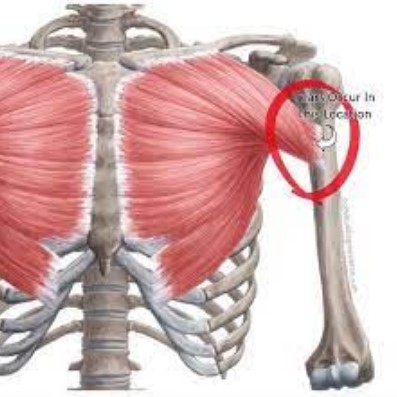 A torn pectoral muscle is a serious injury that can cause significant pain and disability. It is most commonly seen in athletes who participate in activities that involve pushing or pulling motions, such as weightlifting, football, and wrestling. The pectoral muscle is a large muscle located in the chest that helps to move the arm and shoulder. When it is torn, it can cause pain, swelling, and difficulty moving the arm. Treatment for a torn pectoral muscle typically involves rest, physical therapy, and possibly surgery. This article will discuss the causes, symptoms, and recovery strategies for a torn pectoral muscle.
A torn pectoral muscle is a serious injury that can cause significant pain and disability. It is most commonly seen in athletes who participate in activities that involve pushing or pulling motions, such as weightlifting, football, and wrestling. The pectoral muscle is a large muscle located in the chest that helps to move the arm and shoulder. When it is torn, it can cause pain, swelling, and difficulty moving the arm. Treatment for a torn pectoral muscle typically involves rest, physical therapy, and possibly surgery. This article will discuss the causes, symptoms, and recovery strategies for a torn pectoral muscle.
Understanding the Causes of a Torn Pectoral Muscle: What You Need to Know
A torn pectoral muscle is a serious injury that can cause significant pain and limit mobility. Understanding the causes of a torn pectoral muscle can help you prevent this injury and seek appropriate treatment if it does occur.
The pectoral muscles are located in the chest and are responsible for moving the arms and shoulders. A tear in the pectoral muscle can occur due to a sudden, forceful movement of the arm or shoulder, such as when lifting a heavy object or performing a strenuous activity. It can also occur due to repetitive strain, such as when performing the same motion over and over again.
In addition to sudden or repetitive strain, a torn pectoral muscle can also be caused by a direct blow to the chest. This can occur during contact sports, such as football or rugby, or during a car accident.
The symptoms of a torn pectoral muscle include pain in the chest, shoulder, and arm, as well as swelling and bruising. You may also experience difficulty moving your arm or shoulder, and you may hear a popping sound when the injury occurs.
If you suspect that you have a torn pectoral muscle, it is important to seek medical attention as soon as possible. Your doctor will be able to diagnose the injury and recommend a course of treatment. Treatment may include rest, ice, compression, and elevation, as well as physical therapy and medications to reduce pain and inflammation. In some cases, surgery may be necessary to repair the torn muscle.
By understanding the causes of a torn pectoral muscle, you can take steps to prevent this injury. Make sure to warm up before engaging in any strenuous activity, and avoid lifting heavy objects without proper form. If you do experience any pain or discomfort in your chest, shoulder, or arm, seek medical attention right away.
Diagnosing and Treating a Torn Pectoral Muscle: Symptoms and Recovery Strategies
A torn pectoral muscle can be a painful and debilitating injury. It is important to recognize the symptoms of a torn pectoral muscle and to seek medical attention as soon as possible. With proper diagnosis and treatment, a full recovery is possible.
Symptoms
The most common symptom of a torn pectoral muscle is sudden, sharp pain in the chest area. This pain may be accompanied by swelling, bruising, and difficulty moving the arm. Other symptoms may include a popping sensation in the chest, numbness, and weakness in the arm.
Diagnosis
If you suspect you have a torn pectoral muscle, it is important to seek medical attention. Your doctor will likely perform a physical exam and ask questions about your symptoms. Imaging tests such as an X-ray or MRI may also be used to confirm the diagnosis.
Treatment
Treatment for a torn pectoral muscle will depend on the severity of the injury. In mild cases, rest and physical therapy may be enough to promote healing. In more severe cases, surgery may be necessary to repair the muscle.
Recovery Strategies
Once the injury has been treated, it is important to follow a rehabilitation program to ensure a full recovery. This may include physical therapy, stretching, and strengthening exercises. It is also important to rest and avoid activities that could aggravate the injury.
Conclusion
A torn pectoral muscle can be a painful and debilitating injury. It is important to recognize the symptoms and seek medical attention as soon as possible. With proper diagnosis and treatment, a full recovery is possible with the help of a rehabilitation program.Torn pectoral muscles can be a painful and debilitating injury, but with proper diagnosis and treatment, recovery is possible. Physical therapy, rest, and proper nutrition are all important components of a successful recovery. It is important to follow the advice of your doctor and physical therapist to ensure a safe and successful recovery. With the right care and attention, you can return to your normal activities and enjoy a full and healthy life.